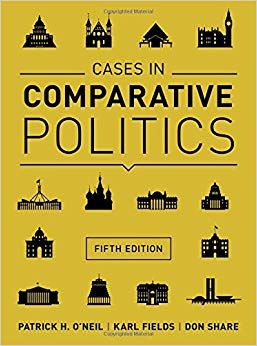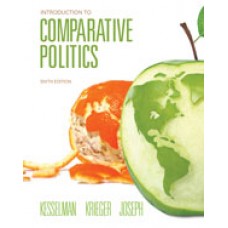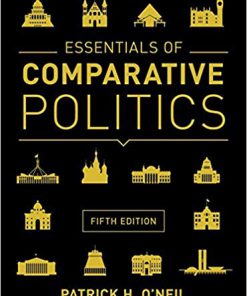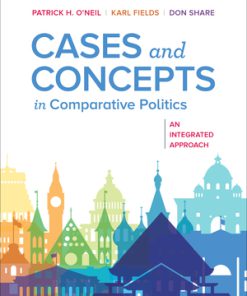Test Bank for Cases in Comparative Politics (Fifth Edition) Fifth Edition
$35.00 Original price was: $35.00.$26.50Current price is: $26.50.
Test Bank for Cases in Comparative Politics (Fifth Edition) Fifth Edition
This is completed downloadable of Test Bank for Cases in Comparative Politics (Fifth Edition) Fifth Edition

Product Details:
- ISBN-10 : 0393937542
- ISBN-13 : 978-0393937541
- Author: Patrick H. O’Neil, Karl Fields, Don Share
Cases for Comparative Politics, Fifth Edition, is a set of thirteen country studies that describe politics in the United Kingdom, the United States, India, Brazil, Iran, France, Germany, Japan, Russia, China, Mexico, South Africa, and Nigeria. This casebook applies the conceptual framework developed in the core textbook, Essentials of Comparative Politics, across countries with a consistent organization that integrates concepts and cases, facilitates comparison, and aids understanding.
Table of Content:
- Part I: A Framework for Understanding Comparative Politics
- Chapter 1: Introduction
- Comparative Politics: What Is It? Why Study It? How to Study It?
- What Is Comparative Politics?
- Why Study Comparative Politics?
- How Do Comparativists Study Politics?
- Three Key Questions in Comparative Politics
- What Explains Political Behavior?
- Who Rules?
- Where and Why?
- Plan of the Book
- Key Concepts
- Works Cited
- Resources for Further Study
- Web Resources
- Chapter 2: The Modern State
- Characteristics of the Modern State
- Territory
- External and Internal Sovereignty
- Legitimacy
- Bureaucracy
- Historical Origins of Modern States
- Modern States in Europe
- Premodern States Outside Europe
- The Export of the Modern State
- Strong, Weak, and Failed States
- Case Studies of State Formation
- The Strongest States
- Case Study: Germany: The First Modern Welfare State
- Case Study: Japan: Determined Sovereignty
- Case Study: United Kingdom: The Long Evolution of a Strong State
- Case Study: The United States: A Consciously Crafted State
- Moderately Strong States
- Case Study: Mexico: Challenges to Internal Sovereignty
- Case Study: China: Economic Legitimacy Over Political Reform
- Case Study: Brazil: A Moderately Strong and Now Legitimate Modern State
- Case Study: India: Enduring Democracy in a Moderately Weak State
- Case Study: Russia: Strong External Sovereignty With Weak Rule of Law
- The Weakest States
- Case Study: Iran: Claiming Legitimacy via Theocracy
- Case Study: Nigeria: An Extremely Weak State
- Conclusion
- Key Concepts
- Works Cited
- Resources for Further Study
- Web Resources
- Chapter 3: States, Citizens, and Regimes
- Citizens and Civil Society
- Regimes, Ideologies, and Citizens
- Liberal Democracy
- Case Study: United Kingdom: “Cradle of Democracy”
- Communism
- Case Study: Russia: The First Self-Proclaimed Communist Regime
- Fascism
- Case Study: Germany: Rise of the Nazi Party and a Totalitarian State
- Modernizing Authoritarianism
- Case Study: Brazil: A Modernizing Authoritarian Regime in Military Form, 1964–1985
- Personalist Regimes
- Case Study: Nigeria: A Personalist Regime in Uniform, 1993–1998
- Electoral Authoritarianism
- Case Study: Mexico: Electoral Authoritarianism Under the PRI
- Theocracy
- Case Study: The Islamic Republic of Iran: Theocratic State, 1979–
- Conclusion
- Key Concepts
- Works Cited
- Resources for Further Study
- Web Resources
- Chapter 4: States and Identity
- Understanding Identity
- The Policy Debate
- The Demands of Identity Groups
- Arguments for Group Rights and Recognition
- Arguments Against Group Rights
- Nations, Nationalism, and Immigration
- Case Study: Nationalism in Germany
- Ethnicity
- Case Study: The Evolving Role of Ethnicity in Nigeria
- Race
- Case Study: Racial Politics in the United States
- Social Class
- Case Study: The United Kingdom: Evolving Class Politics in a Class-Divided Society
- Religion: Recognition, Autonomy, and the Secular State
- Religion as Group Identity
- State Response to Religion: Differing Forms of Secularism
- Case Study: India: Secularism in a Religious and Religiously Plural Society
- Gender and Sexual Orientation: The Continuing Struggle for Recognition, Social Status, and Representation
- Debating Goals
- Objectives and Outcomes
- Case Study: Iran: Women’s Social Gains, Political and Cultural Restrictions, and Islamic Feminism
- Case Study: Brazil: LGBTQ Rights in a New Democracy
- Conclusion
- Key Concepts
- Works Cited
- Resources for Further Study
- Web Resources
- Part II: Political Systems and How They Work
- Chapter 5: Governing Institutions in Democracies
- Executives and Legislatures
- Parliamentarism: The Westminster Model
- Case Study: Parliamentary Rule in Britain and India
- Presidential Systems: The Separation of Powers
- Case Study: Presidentialism in the United States and Brazil
- Semipresidentialism: The Hybrid Compromise
- Case Study: Russia: Semipresidentialism in a New Democracy With Weak Institutions
- Comparing Executive–Legislative Institutions
- Accountability
- Policymaking
- Stability
- Judiciary
- Judicial Review and the “Judicialization” of Politics
- Judicial Independence and Institutional Strength
- Case Study: The Judiciary: Brazil
- Bureaucracy
- Bureaucracy and Corruption
- Case Study: Bureaucratic Control and Corruption: Japan
- Federalism
- Why Countries Adopt Federalism
- Federalism and Accountability
- Federalism and Minority Rights
- Trends in Federalism
- Case Study: Federalism: Mexico, India, and Russia
- Conclusion
- Key Concepts
- Works Cited
- Resources for Further Study
- Web Resources
- Chapter 6: Institutions of Participation and Representation in Democracies
- The Electoral System
- Single-Member Districts: “First-Past- the-Post” and Majoritarian Voting
- Proportional Representation
- Mixed, or Semiproportional, Systems
- Formal Institutions: Political Parties and Party Systems
- Party Systems: Number and Strength
- Origins of Party Systems
- Political Parties: Members, Strength, and Ideology
- A Crisis of Party Democracy?
- Civil Society
- Government–Interest Group Interaction: Two Models
- Case Studies in Participation and Representation
- Case Study: The United Kingdom: SMD/FPTP, Two Parties, and Pluralism
- Case Study: Germany: A Multiparty System and Neocorporatism Under Threat
- Case Study: Japan: From Dominant Party to Two-Party System?
- Case Study: India: From Dominant Party to Multiparty Democracy
- Case Study: Brazil: Parties and Civil Society in a Young Democracy
- Conclusion
- Key Concepts
- Works Cited
- Resources for Further Study
- Web Resources
- Chapter 7: Contentious Politics: Social Movements, Political Violence, and Revolution
- Framing Contentious Politics
- Why Contentious Politics Happen
- How Contentious Politics Happen
- What Effects Do Contentious Politics Have?
- Case Study: The United States: The Tea Party and the Resistance
- Political Violence
- Theories of Political Violence
- Civil War
- Terrorism
- Case Study: Mexico: The Zapatista Rebellion
- Case Study: Nigeria: Boko Haram and Terrorism
- Revolution
- Types of Revolution
- Why Do Revolutions Happen?
- Case Study: Revolution: China and Iran
- Conclusion
- Key Concepts
- Works Cited
- Resources for Further Study
- Web Resources
- Chapter 8: Authoritarian Institutions
- Trends in Authoritarian Rule
- The Dictator’s Dilemma: Governing Authoritarian Regimes
- Elections, Parties, and Legislatures
- Clientelism and Civil Society
- Case Study: China: From Communist to Modernizing Authoritarian Rule
- Case Study: Russia: Creating an Electoral Authoritarian Regime
- Case Study: Iran: A Theocratic, Electoral Authoritarian Regime
- Conclusion
- Key Concepts
- Works Cited
- Resources for Further Study
- Web Resources
- Chapter 9: Regime Change
- Trends in Regime Change
- Regime Change: Transitions to Democracy
- Transitions to Democracy, Democratic Consolidation, and Democratic Backsliding
- Explaining Democratization, Consolidation, and Backsliding
- Case Study: Mexico: Transition From an Electoral Authoritarian Regime
- Case Study: Nigeria: Neopatrimonial Transition
- Regime Change: Transitions to Authoritarian Rule
- Military Coups
- Revolution
- Authoritarianization
- Case Study: Comparing Coups: Brazil and Nigeria
- Case Study: Russia: Transition to an Electoral Authoritarian Regime
- Conclusion
- Key Concepts
- Works Cited
- Resources for Further Study
- Web Resources
- Part III: Political Economy and Policy
- Chapter 10: Political Economy of Wealth
- The Market, Capitalism, and the State
- Capitalism
- Essential Roles
- Beneficial Roles
- Politically Generated Roles
- Key Economic Debates
- Keynesianism
- Neoliberalism
- Keynesianism Versus Neoliberalism: An Ongoing Debate
- Types of Capitalist Economies
- Liberal Market Economies
- Coordinated Market Economies
- Globalization: A New World Order or Déjà Vu All Over Again?
- A Brave New World?
- Causes of Globalization
- Globalization and the European Union
- Political Responses to Globalization
- Globalization and Inequality
- States and Markets Around the World
- Case Study: The United States: The Free-Market Model
- Case Study: United Kingdom: Radical Reform in a Liberal Market Economy
- Case Study: Germany: Struggling to Reform a Coordinated Market Economy
- Case Study: Japan: The Developmental State and Its Crisis
- Conclusion
- Key Concepts
- Works Cited
- Resources for Further Study
- Web Resources
- Chapter 11: Political Economy of Development
- What Is “Development”?
- Development and Globalization
- The Development Debate
- The ISI Era
- The SAP Era
- The Developmental State
- The Pink Tide in Latin America
- The Bottom Billion
- Regime Type and Development Success
- Case Studies in Development
- Case Study: Mexico: From Protectionism to Neoliberalism
- Case Study: China: An Emerging Powerhouse
- Case Study: India: Development and Democracy
- Case Study: Iran: Struggling With the Blessings of Oil
- Case Study: Nigeria: A Weak State, Oil, and Corruption
- Conclusion
- Key Concepts
- Works Cited
- Resources For Further Study
- Web Resources
- Chapter 12: Public Policies When Markets Fail: Welfare, Health, and the Environment
- “Welfare”: Social Policy in Comparative Perspective
- Types of Social Policy
- Types of Welfare States
- The Development, Evolution, and Crises(?) of Welfare States
- Comparing Welfare States
- Social Policy in the Global South
- Case Study: Germany: Reforming the Christian Democratic Welfare State
- Case Study: The United States: Reforming the Liberal Welfare State
- Case Study: Brazil: Starting a Welfare State in a Developing Economy
- Health Care and Health Policy
- Health Care and Market Failure
- Health Care Systems
- Common Problems
- Case Study: Germany: Pioneer of Modern Health Policy
- Case Study: United Kingdom: Reforming the NHS
- Case Study: U.S. Health Policy: Trials and Tribulations of the Market Model
- Environmental Problems and Policy
- The Environment and Market Failure
- Risk and Uncertainty
- Policy Options
- Climate Change
- Case Study: The United States: Pioneer That Lost Its Way?
- Case Study: China: Searching for Sustainable Development
- Conclusion
- Key Concepts
- Works Cited
- Resources for Further Study
- Web Resources
- Glossary
- Index
People Also Search:
cases in comparative politics (fifth edition) fifth edition
cases in comparative politics (fifth edition) fifth edition download pdf
cases in comparative politics (fifth edition) fifth edition download scribd
cases in comparative politics (fifth edition) fifth edition test bank download pdf
You may also like…
Test Bank
Test Bank for Essentials of Comparative Politics with Cases, 6th AP Edition, Patrick H O’Neil,
Test Bank
Test Bank for Cognitive Neuroscience: The Biology of the Mind (Fifth Edition) Fifth Edition












